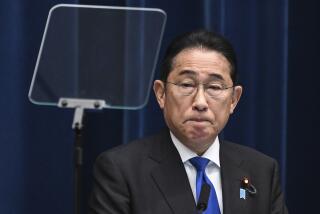Opposition to Try Ousting Japan Coalition
- Share via
TOKYO — Ending a political truce that was called to allow the passage of Japan’s 1994 budget, the opposition Liberal Democratic Party committed itself Wednesday to submitting a no-confidence motion against Prime Minister Tsutomu Hata.
The party’s five top executives and its General Affairs Committee approved a proposal by Yohei Kono, president of the party that ruled Japan from 1955 until last summer, to seek the ouster of Hata’s minority coalition.
Kono asserted that the coalition lacks a mandate and acted “irresponsibly” in trying to retain power while holding only 37% of the seats in the lower house.
Kono was entrusted with deciding when to submit the no-confidence motion after the long-delayed 1994 budget is given final approval by the upper house, an action likely to occur today.
Passage of a no-confidence motion is not assured, and the possibility remains that Kono will back down if he fails to win support from the Socialists, who walked out of the coalition April 26 immediately after electing Hata prime minister.
The Socialists, who now hold the crucial votes in any showdown between the government and the Liberal Democrats, launched talks Wednesday with leaders of Hata’s coalition. The parties sought to work out agreement on key policies as the price for the Socialists’ return to the fold.
“I don’t think the hurdles are too high. Agreement is possible,” Yuichi Ichikawa, secretary general of the coalition’s Buddhist-backed Clean Government Party, said after the meeting. Ichiro Ozawa, the coalition’s chief strategist, agreed.
Wataru Kubo, the Socialists’ secretary general, also paid a call on Liberal Democratic leaders to explain his party’s policy demands.
Even if the Socialists reach a policy agreement with Hata’s forces, the party has demanded that Hata resign before it returns to the government. Such a move would force the lower house of Parliament to vote again to choose a prime minister.
In negotiations conducted before the Clinton Administration announced a breakthrough Wednesday in the North Korean nuclear inspections standoff, the Socialists had insisted that any new coalition reject possible sanctions against North Korea and limit itself to “dialogue and persuasion” to solve the issue of Pyongyang’s suspected development of nuclear weapons.
If Hata refused, Socialist Chairman Tomiichi Murayama declared, his party would join in supporting a no-confidence motion, then form a “caretaker government” with the Liberal Democrats.
On paper, the combination would give the two parties 276 votes, 20 more than a majority. But both parties, archrivals throughout the Liberal Democrats’ 38-year rule, face the possibility of intraparty rebellions.
Former Foreign Minister Michio Watanabe, who toyed with the idea of bolting the Liberal Democrats to join the coalition in April, said he and his faction will abide by the party’s decision to submit a no-confidence motion.
But he promised to seek Kono’s ouster as party chief if the motion fails to pass.
Passage of a no-confidence motion would threaten to force a dissolution of the lower house and a general election in the midst of U.S.-Japanese negotiations to set up a new “framework” to reduce Japan’s global current account surplus of $131 billion and establish rules for trade between the two nations. It also would weaken Japan’s standing at the annual economic summit of the world’s seven major industrial democracies in Naples, Italy, from July 8 to 10.
More to Read
Sign up for Essential California
The most important California stories and recommendations in your inbox every morning.
You may occasionally receive promotional content from the Los Angeles Times.













